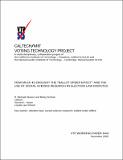How Much is Enough? The "Ballot Order Effect" and the use of Social Science Research in Election Law Disputes
Author(s)
Alvarez, R. Michael; Sinclair, Betsy; Hasen, Richard L.
Downloadvtp_wp44.pdf (322.5Kb)
Metadata
Show full item recordAbstract
Previous empirical research and other related research from survey methodology holds that candidates listed first on an election ballot may gain some measure of advantage from this ballot placement. Using data from the 1998 general election in California, we test whether a candidate’s relative position on the ballot has any statistical effect on vote shares. We find little systematic evidence that candidate vote shares benefit from being listed first on the ballot. We show that there is not a primacy ballot order effect (defined as being listed first on the ballot) in every contest, that when the effect exists it is often very small, and that the effect is evenly distributed between primacy and latency (defined as being listed last on the ballot). We consider how courts should balance the concern over ballot order effect against other interests, such as the costs and potential confusion associated with rotation and randomization.
Date issued
2005-11Publisher
Caltech/MIT Voting Technology Project
Series/Report no.
VTP Working Paper Series;44
Keywords
Election law, Social science research, Ballot order effect